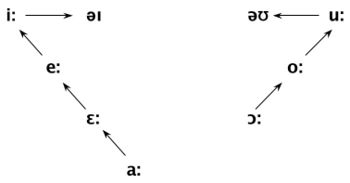The Early Modern English Period
1. Discuss the interplay between politics and the development of English in the period.
The period of the Tudors was relatively peaceful which provided the circumstances for economic stability and growth. The centre of market was London and South East where many people migrated (=> dialect contact). The stability of the period also contributed to standardization of the language (compare to the unrest of the 15th century when people did not care about the language that much). The rule of the Stuarts led to the Civil War and, consequently, to Commonwealth: theatres were closed, the whole set of social norms became extremely Puritanic. With the Restoration of the monarchy in 1660 the situation radically changed, there was more freedom. Besides, the new king, Charles II, brought French back in fashion (=> loan words).
It was agreed that the standard English would be based upon Southern dialects, particularly upon the speech of the well-bred and well-educated. This led to the split between a highly prescriptive, 'correct', Standard English (for writing) and the colloquial General English (a covert norm). Since dialect contact offered sets of linguistic alternatives, the choice made by the speaker turned out to be a marker of his identity.
2. Discuss the interplay between religion and the development of English in the period.
Although Latin still was the language of the Church, the influence of Lutheran Reformation on the Continent could not be ignored. William Tyndale, inspired by the example of Martin Luther, translated the New Testament (his base were Greek and Hebrew texts, not their Latin translation). His translation was influential due to printing and due to the fact that later translations drew on his. From the linguistic point of view, religious texts were quite conservative.
Since Puritanism and Quakerism, flourishing at the time, were reflections of the concerns of the middle and the lower classes respectively, and people of these classes rarely knew Latin, their growing influence meant the growing influence — and usage — of English.
3. Assess the role on the following fields in the development of English in the period.
a) technology: public spelling was determined by printers. At that point all the letters in the alphabet are familiar to the present day speaker of English, although their use somewhat differed. Another important point is that the clients of printers usually belonged to the middle class and they rarely knew any Latin; that is why printers preferred to publish books in English.
b) science: Scientists mostly used the classical languages (=> borrowings from Latin), not so much for the sake of style but because terms seldom had English equivalents; besides, Latin and Greek terms were more preferable in terms of international discourse. The Royal Society, established in 1662, decided to improve the language; it was influential due to the style of writing which was short and factual.
c) translation:
d) literature:
5. The Great Vowel Shift [1]
- mismatch between spelling and pronunciation: begun in ME, spelling fixed by early XVI century, but the sound kept changing).
- change of quality of all long vowels (stressed syllables)
- standardization of the language: synthetic -> analytic
- most significant of all phonological developments in English
- change in pronunciaion of verb tense[2]

6. What kind of social relationship does the usage of singular you and thou reflect in Elizabethan society?
- used to express power relations
- thou becoming an exceptional form
- you used in order to show respect (everyone regarded due to his/her social status)
- children addressing their parent as you and being addressed as thou
- Bruti: use of you/thou based on social distance and emotional attitude
- inferiors addressed as thou, equals as you/thou and superiors as you
- anger/contempt or familiarity/intimacy expressed by the use of thou, neutrality/indifference with you
7. Explain the terms:
- koineization is dialect levelling due to the dialect contact
- prescriptivism is "a view of language which is largely motivated by the move to define what is 'correct' and to condenm what is, consequently, 'incorrect'."[3]
- codification is the process of standardasing and developing a norm
- hard words (inkhorn terms) — a derogatory way to refer to the new words which have Latin origin, hence their meaning is opaque